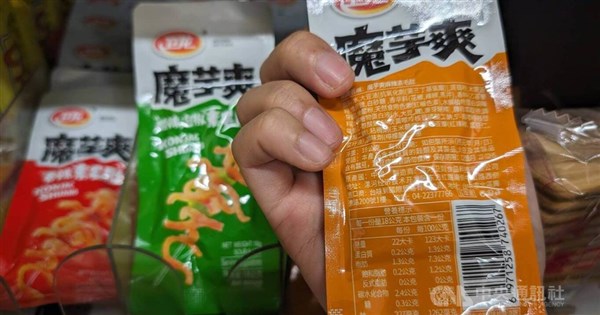
Taipei, Dec. 5 (CNA) A spicy jelly-like snack from China that is a big hit with Taiwan’s elementary school students has led to a call by a Taiwanese federation of teachers to dissuade the children from feasting on unhealthy snacks.
An elementary school teacher recently voiced concerns on Facebook that the savory “Konjac Shuang” snack from China contained an extremely high level of sodium and several additives and that eating too much of it could adversely affect young students’ health.
The Facebook post said that while some teachers have discouraged consumption of the Chinese snack, some students have taken to eating it secretly in the toilet, and it urged schools and parents to do more to keep students away from the snack.
Konjac is a low-carb, high-fiber root vegetable used often to make a flour that is considered a health food.
Wang Chieh-li (王介立), the director of a clinic, has said on Facebook, however, that “Konjac Shuang” is a highly processed food that is high in fat and contains more than 1,000 milligrams of sodium for each serving of 100 grams.
Hou Chun-liang (侯俊良), the president of the National Federation of Teachers Unions (NFTU), told CNA on Monday that if teachers have nutrition and health concerns over some foods, they could explain to students those foods’ adverse health effects to discourage their use.
There was no need to worry if students occasionally try new snacks, Hou said, but if they eat too much or the foods are harmful to people’s health, schools and teachers should take measures to restrict consumption.
To many students and adults, the small pack of “Konjac Shuang” containing spicy strips can be addictive, with people eating one pack after another while ignoring its downsides, especially its high sodium content.
Yen Tzung-hai (顏宗海), an attending physician in the Department of Nephrology of Chang Gung Memorial Hospital in Linkou, said the snack’s 1,000 milligrams of sodium per 100-gram serving approached the daily recommended limits for children.
According to Yen, the recommended daily sodium intake for children 1-3 years old was 1,200 mg, increasing to 1,500 mg for those aged 4-8, 1,800 mg for those 9-13, and 2,300 mg for those 14-18 or above.
Too much sodium in the diet can lead to high blood pressure or cardiovascular disease, Yen said, noting that a small pack of “Konjac Shuang” contained more than 200 mg of sodium.
From Jan. 1, 2022 to Oct. 31 this year, a total of 515,483 kilograms of “Konjac Shuang” was imported from China, according to Taiwan Food and Drug Administration data.
